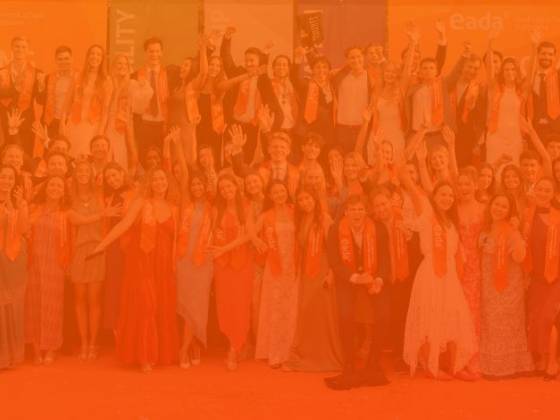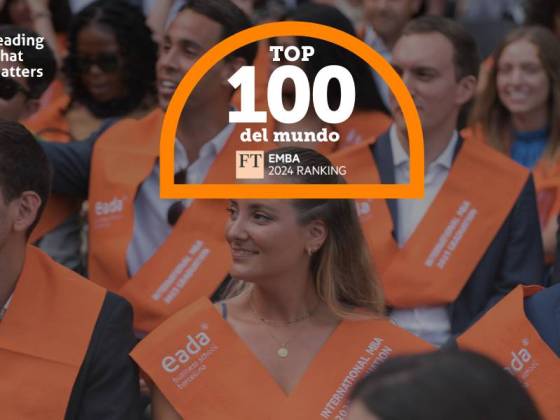MSBI Innovation Challenge 2022
Some weeks ago, Master in Management participants used disruptive innovation to create business ideas in just three days. From 7th to 9th March, Master in Sustainable Business and Innovation participants had the chance to do the same in the first edition of the MSBI Innovation Challenge. In this three-day competition, participants took part in a disruptive innovation Bootcamp class by putting into practice three principles of disruptive innovation: making de impossible possible, the exclusive inclusive, and the inaccessible the accessible.
On the first day of the challenge, Dean Jordi Díaz and Professor James Haigh gave a warm welcome to the class and introduced the basic framework of disruptive innovation. After that, all of them were inspired by three innovators who are three EADA Alumni:
- Sana Khouja (International MBA, Class of 2014), CEO & co-Founder of Drink Zeena. This company has disrupted the wine industry because launched the first organic and vegan Spanish canned wine. As Sana told our participants, “We believe that each and every individual has a responsibility to the planet and the society.” Sana has a wide experience in helping other entrepreneurs to develop new businesses, from social projects, to health, initiatives, and wine ventures.
- Àngel Bou (Executive MBA, Class of 2012), CEO & Co-Founder of Simplr, which is a life-as-a-service platform that transformed the global consumption model for users and companies. As Mr. Bou shared, “We created Simplr for a flexible world -the burden of ownership- and for a sustainable world -powering circular economy-.”
- Stephanie Hoyle (International MBA, Class of 2017), Venture CEO of Farmauna, an e-pharmacy from Auna which is currently investing in the development of health tech in Peru. She explained that her purpose is to democratize access to quality healthcare in South America. To her, “healthcare in this region is one of the largest bust most underserved markets, and is a once-in-a-century tech disruption.”
Besides, Master in Sustainable Business and Innovation participants were supported by 2 EADA Alumni who acted as mentors and helped them in building their projects and preparing the final pitch:
- Priyam Jaiswall (International Master in Management, Class of 2020), who is the Co-Founder and CTO of Tennders.
- Lluís Domínguez (International MBA, Class of 2020), who is the General Manager at Digest Grup Mèdic.
A unique experience
To Professor James Haigh, this is a unique experience in different ways: “First of all, we are talking about a less academic experience within an academic context, so it connects with our learning by doing methodology. We are talking about three intense days, like a real Bootcamp, which is applied to an actual business reality. So, working under pressure for such a short amount of time and having to produce so much in teams take them out of their comfort zone and make them grow.”
To the master’s programme Director, Federica Massa-Saluzzo, it is very important to take part in this challenge just in this moment of the master: “At this point, they have learned enough, so they are fresh to generate something new. I think that is a great equilibrium because they are mature enough in terms of content and technical tools to come up with bright ideas.” According to her, “this challenge complements very well the classes from the rest of the year, because they not only have to make decisions in a limited amount of time, but they have a negative feedback from external actors, like investors o consultants, who come from the both academic and corporate world.” As Mrs. Massa-Saluzzo says, “When you have someone from the industry telling you ‘your idea is not working' and you have 40 hours to change it, you need to put into practice your leadership skills and also a disruptive innovation mindset.”
Final projects
The winning team of the first edition of the MSBI Innovation Challenge 2022 was SunFridges. The team members were Erick Moltzen (Denmark), Abby French (USA), Luna Idriss (Lebanon), Nina Breitenstein (Switzerland) and Katherine Zazueta (Mexico). Moved by the experience of two fellow classmates from Lebanon, this team set out to find a solution to improve the quality of life of the Lebanese people who regularly suffer from power shortages. They focused on the most basic need which is providing food security during insecure times by designing a refrigerator that is powered independently, autonomous and accessible to every household in the country through an innovative business model. As they explained, “we couldn’t solve the whole energy problem in just 48 hours, so we decided to only focus on providing secure and reliable energy for only fridges, which is one of the main energy consumption appliances in a household and we wanted to make it accessible for everyone.”
They felt so happy after taking part in this challenge: “We are doing the Master in Sustainable Business and Innovation and we have been doing a lot of presentations about sustainability for the past few months. But this activity allowed us to work in such amount of time and it really challenged us, more than any other presentations that we did.”
The second finalist was for the project Solvrisa, addressed to families and children who want to raise strong and happy children by making oral healthcare simple, cheap and fun in a convenient, sustainable and affordable way.


